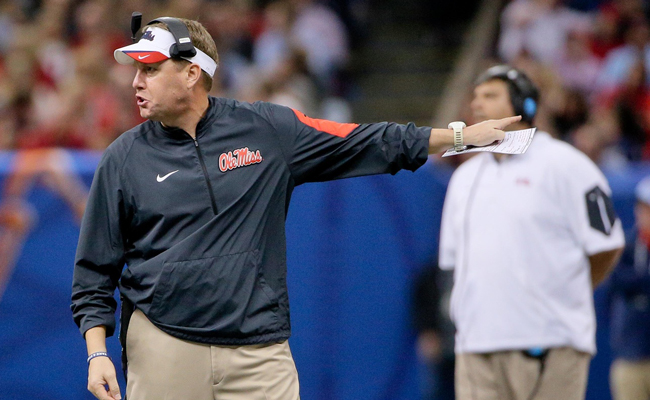
There has been a lot of talk of late about Ole Miss as it relates to football recruiting. The NCAA letter-of-inquiry certainly dominates the conversation.
The narrative will continue to focus with that situation until it is resolved. But it’s also worth, in the interest of fairness, to go on the record and say that a good portion of the Rebels recruiting success and the rise of their program has had a lot to do with factors other than signing elite offensive tackle Laremy Tunsil (whom many of the violations reportedly center around) in the class of 2013.
First and foremost, and I’ve pointed this out many times, the Rebels not only are out-recruiting other programs for no-brainer type talent, they are in many cases out-evaluating and out-developing other programs for players that aren’t among the most highly-recruited in the country.
Tight end Evan Engram, cornerback Mike Hilton, safety Trae Elston and defensive end Marquis Haynes all were on some sort of All-Southeastern Conference football team last season. All were rated three stars coming out of high school in the states of Georgia (Engram and Hilton), Alabama (Elston) and Florida (Haynes).
It’s that type of quality evaluation and development, combined with landing elite players like Tunsil, Robert Nkemdiche, Laquon Treadwell and others that allow a program in the toughest football division in the country to rise. It’s also the type of player development that is very attractive to prospects, many of whom have NFL ambitions. Hugh Freeze and his staff can point to a track record in that department.
One also has to consider that Ole Miss recruits a large portion of its classes from within the state of Mississippi. While this past cycle was not as dominant (some prospects did leave the state, namely defensive back Nigel Knott and offensive tackle Scott Lashley for Alabama), the Rebels and Mississippi State have closed the borders in recent cycles and have kept the Mississippi talent in Mississippi. When a program can land its share of the in-state talent, it’s contagious and sets up nicely for future cycles.
Kids want to go where their friends or players they grow up playing against or being familiar with go and also within a reasonable distance so their families can come see them play. Freeze and Mullen have made the two in-state programs the popular choice for some time now.
Also, you have to consider, that recruiting momentum is a bit contagious. When Ole Miss landed Tunsil, Treadwell and Nkemdiche in the 2013 cycle, it almost gave other prospects permission to give the Rebels a serious look. Make no mistake that has set the stage for the recruiting success that Ole Miss enjoys today.
The Rebels have an excellent coaching staff and Freeze doesn’t get enough credit for his on-field coaching or for the fact that most of the players that head to Oxford develop. Even with the Tunsil issues included in the Notice Of Allegations report, this isn’t something that was unexpected nor does it seem, on the surface, to be a huge deal.
If something else comes to light, obviously that’s a different story, but that doesn’t change that there are other factors that have contributed to the success and rise of the Rebels beyond the “no-brainer” type of huge recruiting wins they have enjoyed during the time Freeze has been the coach.
Recruiting writer for Saturday Down South






